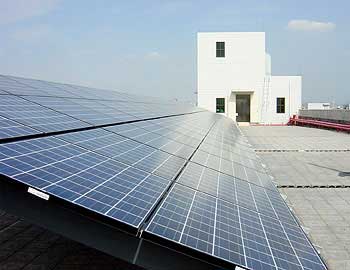 China Urges Electricity Suppliers to Buy 'Green' PowerSep 10, 2007 - Ling Li - RenewableEnergyAccess.com
Starting this month, China's State
Electricity Regulatory Commission (SERC) will assume
nationwide oversight over power companies that are
required under the country's renewable energy law
to prioritize purchases of the maximum amount of
'green' electricity available in their coverage
areas, according to a recent regulation released
by SERC. This renewable power includes energy generated
from sources such as hydropower, wind power, biomass,
solar power, tidal power, and geothermal energy.
The regulation also details the authority, measures, and responsibilities necessary for SERC to facilitate the integration of renewable sources into power systems. It allows all renewable power facilities, with the exception of medium- and large-scale hydropower plants, to receive government subsidies in power pricing rather than having to participate in competitive bidding. China adopted its first law on renewable energy in 2005 and has since issued several supplementary rules and regulations to boost the use of renewable energy. Yet renewable sources still account for only a very small portion of domestic power supply, mainly because of the high generation costs. The cost of electricity generated from solar power, for example, is some 3 yuan [US$ 0.39] per kilowatt-hour, while that from a typical coal-fired power plant is only around 0.22 yuan [US$0.028] per kWh. A supplementary regulation on renewable power pricing and cost sharing, authored by the National Development and Reform Committee, has helped break this cost bottleneck by requiring power suppliers on the grid to purchase renewable electricity at either a government-fixed or a government-directed price. The additional cost of renewable energy is to be borne by electricity users. An extra "renewable energy" charge of 0.001 yuan [US $0.00013] for every unit of electricity has been added to household utility bills since June 2006. China's rapid economic growth relies heavily on coal-fired power and poses a serious challenge to the nation's energy supply as well as to its natural resources and environmental quality. The central government has recognized the importance of promoting renewable energy as a fundamental national strategy to achieve the dual goals of energy efficiency and sustainable development. According to China's middle- and long-term plan for renewable energy development, the share of renewables used in primary energy consumption is to be increased to roughly 10 percent by 2010 and nearly 16 percent by 2020, up from some 7 percent in 2005. "Green" electricity, meanwhile, is to account for some 6 percent and 8 percent of the nation's total power generation by 2010 and 2020, respectively. The success of renewable energy typically requires both government supports and market incentives, according to some entrepreneurs in the power industry. They argue that in addition to the current price subsidy, the Chinese government needs to further develop a mix of strong policies to encourage renewable power generation, such as providing loans or tax credits to green power producers. This article first appeared in ChinaWatch, a joint initiative of the Worldwatch Institute and Beijing-based Global Environmental Institute (GEI), and was reprinted with permission from the Worldwatch Institute. For Further Information |
Email this page to a friend
If you speak another language fluently and you liked this page, make
a contribution by translating
it! For additional translations check out FreeTranslation.com
(Voor vertaling van Engels tot Nederlands)
(For oversettelse fra Engelsk til Norsk)
(Для дополнительных
переводов проверяют
FreeTranslation.com )


